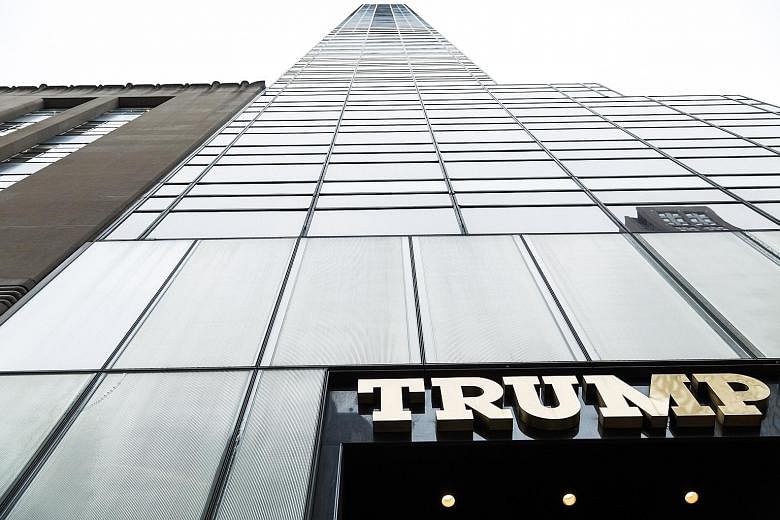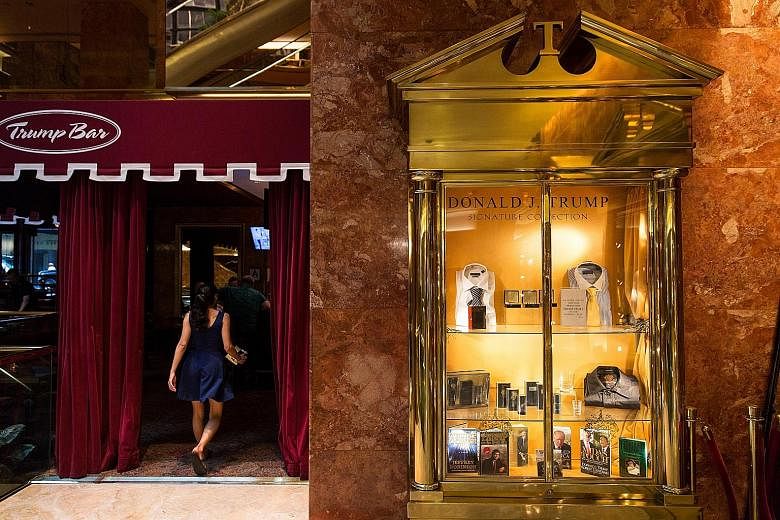NEW YORK • On the campaign trail, Mr Donald Trump, the Republican presidential nominee, has sold himself as a businessman who has made billions of dollars and is beholden to no one.
But an investigation by The New York Times into the financial maze of Mr Trump's real estate holdings in the United States reveals that companies he owns are carrying at least US$650 million (S$870 million) in debt - twice the amount than can be gleaned from public filings he has made as part of his bid for the White House.
The NYT inquiry also found that his fortunes depend deeply on a wide array of financial backers, including one he has cited in attacks during his campaign.
For example, an office building on Avenue of the Americas in New York, of which Mr Trump is part owner, carries a US$950 million loan. Among the lenders: the Bank of China, one of the largest banks in a country that Mr Trump has railed against as an economic foe of the United States; and Goldman Sachs, a financial institution he has said controls Mrs Hillary Clinton, the Democratic nominee, after it paid her US$675,000 in speaking fees.
As president, Mr Trump would have substantial sway over monetary and tax policy, as well as the power to make appointments that would directly affect his own financial empire.

Yet NYT's examination underscored how much of Mr Trump's business remains shrouded in mystery. He has declined to disclose his tax returns or allow an independent valuation of his assets.
Earlier in the campaign, Mr Trump submitted a federal financial disclosure form. It said his businesses owed at least US$315 million to a relatively small group of lenders and listed ties to more than 500 limited liability companies. Though he answered the questions, the form appears to have been designed for candidates with simpler finances than his and did not require disclosure of portions of his business activities.
Beyond finding that companies owned by Mr Trump had debts of at least US$650 million, NYT discovered that a substantial portion of his wealth is tied up in three passive partnerships that owe an additional US$2 billion to a string of lenders, including those that hold the loan on the Avenue of the Americas building. If those loans were to go into default, Mr Trump would not be held liable, the Trump Organisation said. The value of his investments, however, would certainly sink.
Law professor Richard Painter of the University of Minnesota, who from 2005 to 2007 was the chief White House ethics lawyer under president George W. Bush, compared Mr Trump to Mr Henry Paulson Jr, a former chief executive of Goldman Sachs whom Mr Bush appointed treasury secretary.
Prof Painter advised Mr Paulson on his decision to sell his Goldman Sachs shares, saying it was clear that Mr Paulson could not simply have placed that stock in a trust and pretended it did not exist.
If Mr Trump were to use a blind trust, the professor said, it would be "like putting a gold watch in a box and pretending you don't know it is in there".
Mr Trump once said on CNN: "I am the king of debt. I love debt."
But in his career, debt has sometimes got the better of him, leading to at least four business bankruptcies.
He is, however, quick to stress that these days, his companies have very little debt. Mr Trump indicated in the financial disclosure form that he was worth at least US$1.5 billion and has said publicly that the figure is actually greater than US$10 billion.
Recent estimates by Forbes and Fortune magazines and Bloomberg have put his worth at less than US$5 billion.
Despite Mr Trump's holdings, Mr Allen Weisselberg, the chief financial officer of the Trump Organisation, said the candidate should not be held to the same standards that might apply to the heads of companies in highly regulated industries.
Others disagree. Mr Trump's opaque portfolio of business ties makes him potentially vulnerable to the demands of banks and to business people in the US and abroad, said Prof Painter.
"The success of his empire depends on an ability to get credit, to get loans extended to his business entities," he said. "And we simply don't know a lot about his financial dealings, here or around the world." NEW YORK TIMES



